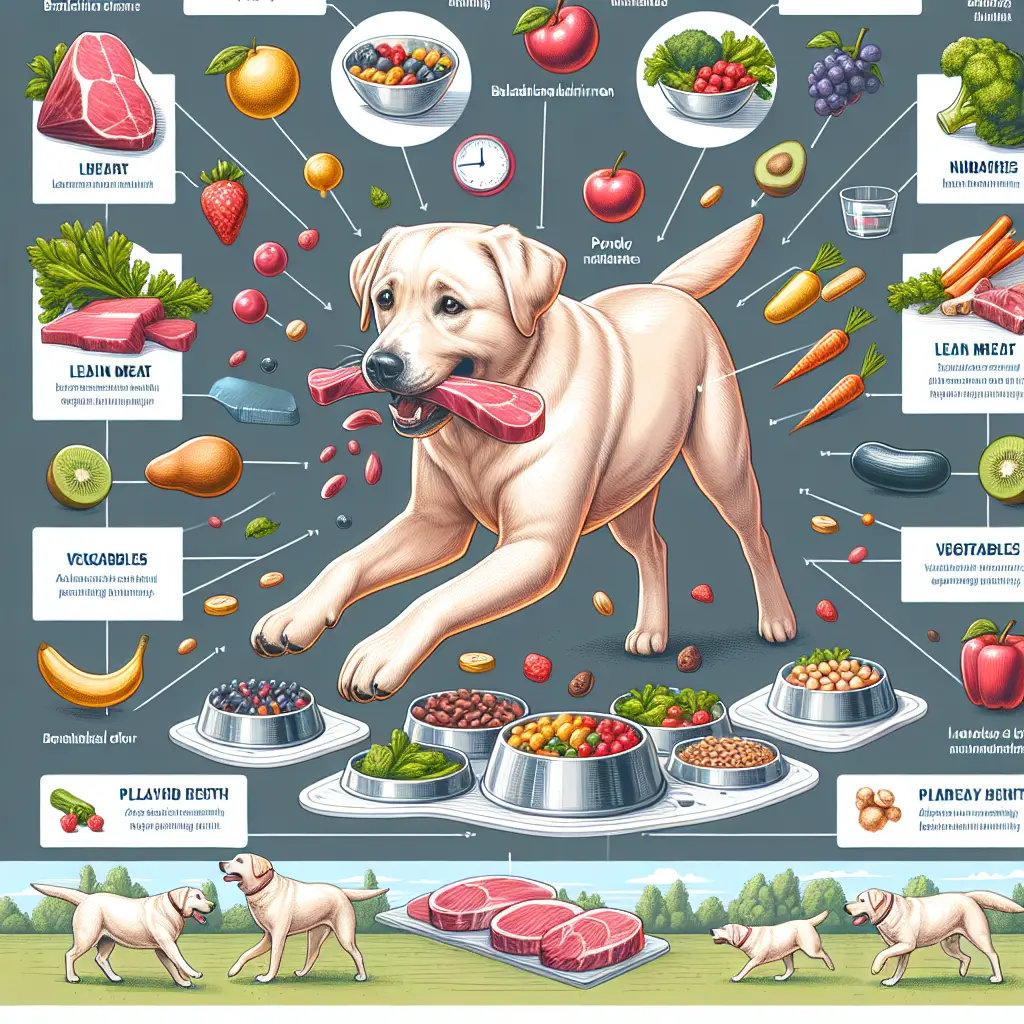
As a beloved family pet known for its friendly nature and boundless energy, the Labrador Retriever requires specific dietary consideration to maintain its health and vitality. Understanding the nutritional needs of Labradors is crucial in providing a balanced diet that supports their active lifestyle. This comprehensive guide will delve into the Labrador Retriever nutrition, offering insights into the optimal diet for Labradors, Labrador health guidelines, and best food practices for these cherished canines.
Understanding Labrador Retriever Nutrition
Labradors are known for their love of food, which unfortunately makes them prone to obesity. A study in the Journal of Veterinary Internal Medicine found that obesity is common in Labradors, making weight management critical (source: PubMed). This begins with understanding the caloric needs of your pet. Labrador calorie requirements vary based on age, weight, and activity level, but an average adult Labrador typically needs about 1,400 to 1,800 calories per day.
Feeding Labrador puppies requires special attention as they grow rapidly during their first few months. Puppies should be fed a high-quality puppy formula that supports their developmental needs. It’s essential to follow feeding guidelines provided by the food manufacturer or your vet to avoid overfeeding.
Optimal Diet for Labradors
The best food for Labrador Retrievers includes commercially available or home-prepared diets that meet the standards set by the Association of American Feed Control Officials (AAFCO). Ensure that the diet you choose is complete and balanced, containing all necessary nutrients. A mix of dry kibble and wet food can also be beneficial, providing hydration and enhancing palatability.
Protein is a cornerstone of a healthy diet for Labradors. High-quality sources such as chicken, turkey, fish, and beef support muscle development and maintenance. However, it's important to balance protein intake with healthy fats like omega-3 fatty acids, which promote a healthy coat and skin, and carbohydrates that provide energy.
Recent news highlighted in "Dog Aggression 2024" indicates that while Labradors are less likely to become aggressive, proper nutrition plays a role in overall behavior and health (source: Dog Aggression 2024). A well-fed dog with a balanced diet is generally healthier and happier.
Labrador Health Guidelines and Nutritional Care
Beyond basic nutrition, Labrador health guidelines emphasize regular veterinary check-ups to monitor health issues such as hip dysplasia and heart conditions that are prevalent in the breed. Discussing your Labrador’s diet with your vet can ensure you're meeting these health needs.
For Labrador weight management, consider feeding smaller, more frequent meals to help control hunger and manage weight effectively. Also, be mindful of treats; these should not constitute more than 10% of a dog’s daily caloric intake.
Feeding Tips and Meal Planning
Labrador feeding tips often include using meal times as an opportunity for training. Labradors are eager to please and can learn quickly that sitting quietly earns them their meal. Always ensure fresh water is available, particularly if your dog primarily eats dry food.
Planning meals for your Labrador can seem daunting, but establishing a routine helps manage their dietary needs effectively. Labrador meal planning should consider activity levels—more active dogs may require additional caloric intake to fuel their energy needs.
Balanced Diet for Labradors
A balanced diet for Labradors should include vitamins and minerals that support joint health, particularly as they age. Supplements like glucosamine can be beneficial, but it's best to consult with a veterinarian before starting any new supplement regimen.
Recent initiatives like those discussed at a recent assembly adopting broader animal welfare code changes underscore the importance of overall animal health and well-being (source: Local News). These changes often lead to improved standards in pet food quality and safety.
Labrador Food Recommendations
When choosing commercial foods, look for brands that use real meat as the first ingredient without unnecessary fillers like corn or wheat. For homemade diets, ensure you're following veterinary-approved recipes to avoid nutritional imbalances.
In light of recent events where fundraisers raised significant funds for guide dogs (source: Local Charity News), it's clear that proper nutrition also plays a crucial role in preparing Labradors for roles as service animals. Well-nourished dogs are better equipped to learn and perform tasks required of them.
Conclusion
In conclusion, providing your Labrador Retriever with a nutritionally balanced diet tailored to their specific needs is crucial for their overall health and happiness. Regular veterinary visits, appropriate calorie management, and a keen eye on meal balance will ensure your Labrador thrives. Remember, each dog is unique, so it’s important to adapt these guidelines accordingly.
Thank you for joining me on this comprehensive journey through Labrador Retriever nutritional care. Here’s to many happy, healthy years with your furry friend!
Warmly,
Amanda Gibson